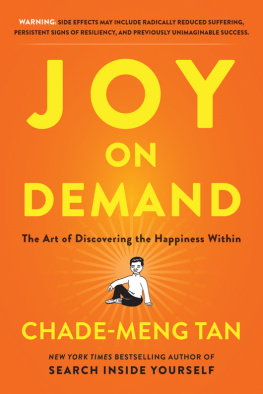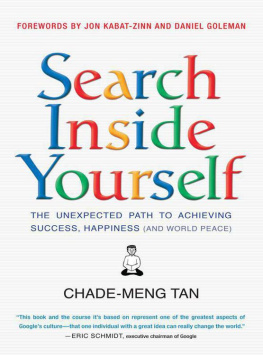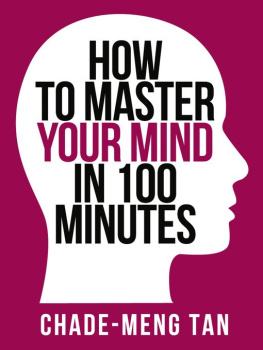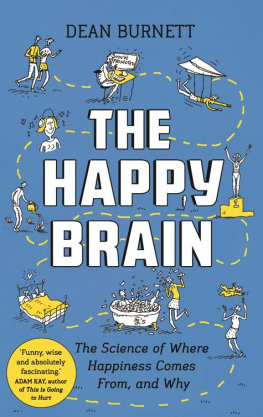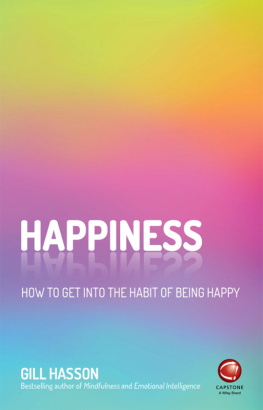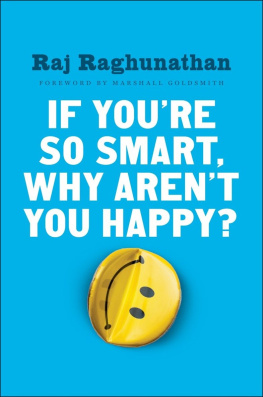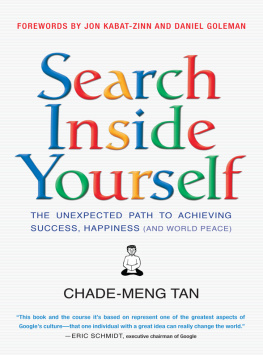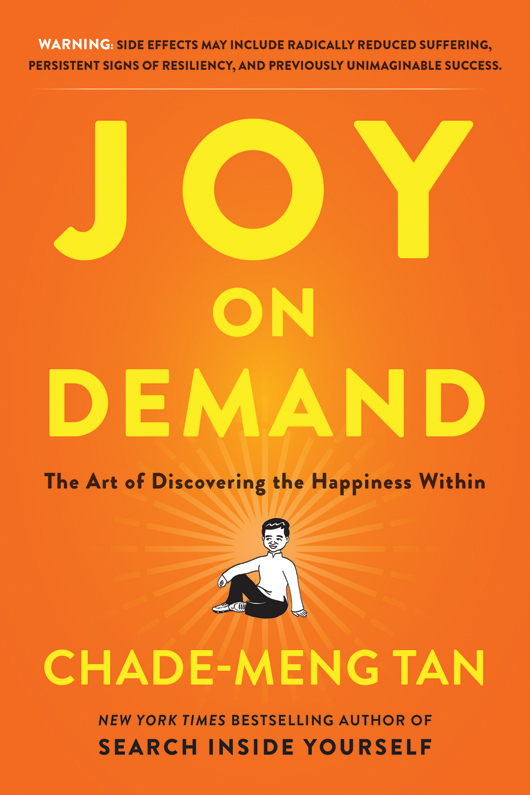There are many things in life
that suck. Joy isnt one of them.
To all who have taught me to access joy,
especially in my darkest hours, thank you.

Contents
Guide
Let me tell you my story. Once upon a time, there was a smart and happy boy who, at twenty-one, had grown into a joyful, confident, and well-adjusted young man. That wasnt me.
I was born in Singapore in 1970. That year, tiny Singapore was a poor developing country with no natural resources. By the time I turned twenty-one, Singapore had become a rich country with one of the highest per-capita incomes in the world. It was the Singapore economic miracle. My familys fortune grew in tandem with that national economic miracle. My father had started his career as a ten-year-old hawker selling wares along the streets of downtown Singapore. A few years before I was born, he joined the army to get out of poverty. When I was an infant, we were so poor, my mother resorted to eating only one and a half meals a day to conserve what little money we had. Fast-forward twenty-one years: my father had retired from the army as a high-ranking officer and had gone on to become a wealthy business leader.
When I was twelve, I taught myself to program a computer, which back in 1982, was a big deal. By fifteen, I won my first of many national programming awards. Almost fifteen years after that, when I was twenty-nine, my programming skills landed me a job as one of the earliest engineers at a small startup company called Google (which has grown a little bigger since I joined in 2000). At Google, I was so notorious for my jolliness and humor that my job title became Jolly Good Fellow (which nobody can deny). It started as a joke, but it stuck after it made the front page of The New York Times.
From this story, you would think that I have always been happy. Actually, nope. In fact, I spent most of my early life on the wrong end of the happiness spectrum. Up until I was twenty-one, I was miserable. Misery was my constant companion, and this constant companion smelled like it hadnt showered since Nixon was president.
Happiness was not something that came naturally to meit was a skill I had to learn.

Happiness Is Highly Trainable
Once upon a time, a Chinese guy went to see a fortune-teller. After the fortune-teller read his palms carefully, she said to him, You are miserable now, and you will continue to suffer misery until you turn forty. He asked excitedly, What happens after forty? Will my misery finally go away? And she said, No, after forty, youll get used to it. That was not me either.
Fortunately for me, my story had a much happier ending. I was miserable until I was twenty-one. That year, I learned that the ability to access joy is highly trainable. I developed the skills to access joy, and I became happy. This book is about those skills, so that you, too, can learn them and be happy.
Studies suggest that people have a remarkable ability to adapt to both good and bad fortune, and that we each have a relatively stable level of happiness that we eventually return to even after major positive or negative life events. A famous 1978 study, for example, shows that even people who won a lot of money in the lottery, or who were paralyzed in accidents, eventually returned to their average levels of happiness. None of the other factors studied, including socioeconomic status, education, family income, marital status, or religiosity could account for more than 3 percent of the difference in peoples happiness. In other words, you are born with a happiness set point that is mostly determined by your genes. A large part of our happiness depends on our luck in the genetic draw, and I just happened to draw a bad hand. I got a low happiness set point. I imagine a cartoon deity read my genetic chart as I was born and went, like, Sorry, bro, sucks to be you. Bye.

Oh no! What to do? Fortunately, I found the solution. In the same way that physical qualities such as strength and agility are highly trainable, mental qualities such as joy and calmness are also highly trainable.
Pretend that you know nothing of the concept of physical fitness, and pretend that I just showed you how to do bicep curls by moving a dumbbell up and down with one arm, and then I tell you to do the same. You may reasonably think Im stupid or something. The question you should ask me is, Why? Why would I want to waste my time and energy moving a heavy object up and down? (Among some engineers I know, this is known as WTF? For those of you who have to ask, WTF stands for What is happening?!)
Once you understand the ideas behind exercise and physical fitness, bicep curls make perfect sense. Every time you move a dumbbell up and down, you strengthen your muscles a little bit more. If you do a lot of bicep curls and other weight-lifting exercises, you gain a physical quality known as strength. With strength, you can do things you could never imagine doing before. For example, you can now open really stubborn pickle jars and literally throw out the bad boyfriend. In addition to developing strength (and gaining the ability to literally throw out the bad boyfriend), though, you also develop something even more important: physical health and fitness. With physical health and fitness, every single aspect of your life improves. You have more energy, you suffer fewer sick days, and you become more successful at your work because you have more energy and fewer sick days. You look better in the mirror, you are confident, and you feel great. If you have never heard of the idea of physical training, the claim I just made should blow your mind, because Im claiming that you can deliberately effect life-changing physiological changes with simple training exercises like repeatedly moving a heavy object up and down, and in doing so, improve every single aspect of your life.
In my long struggle with misery, quite by accident, I discovered the mental equivalent of physical exercise. I found that one can deliberately effect life-changing mental changes with simple training exercisesif you will, bicep curls for the mind. We can develop major mental skills like the ability to access joy on demand, and in doing so, improve every single aspect of our lives. The mental equivalent of physical exercise is meditation.
Meditation is another word for mind training. It is scientifically defined as a family of mental training practices that are designed to familiarize the practitioner with specific types of mental processes. So mindfulness is a specific way of paying attention, and mindfulness meditation means practicing this way of paying attention.
I started meditating because I was miserable enough to try anything. Back in those days in my part of Asia, meditation wasnt cool. In fact, it was the opposite of coolit was kind of weird. We didnt have hippies in Singapore when I was growing up, but we did have our share of folks whom family members gossiped about with an odd mixture of fascination and embarrassment, and those were the type of people who tended to be associated with meditation. Worse still, there were no secular meditation teachers, so the only way to learn meditation back then was in Buddhist centers (which is why I came out of this experience determined to make meditation practices accessible in a secular form so people dont have to be Buddhists to benefit from them, but thats another story). Even worse still, in those days, Buddhism was perceived in some parts of Asia, including Singapore, as old, dusty, boring, and profoundly uncool. So a skinny, awkward, geeky young man trying hard to look cool to his friends had to be really desperate to try to learn meditation, and that was me.

